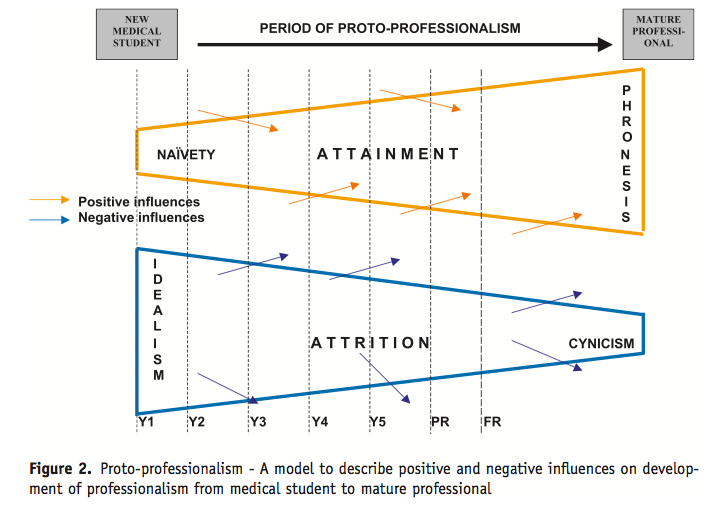



Getting to Professional
Is every medical school graduate a professional? Every resident trainee? Everyone in practice?
What is the process of becoming a professional?
Sean Hilton[1] postulates that professionalism is developed over time through attainment and attrition.

Hinton[1] considers ’phronesis’ to be practical wisdom, certainly this must be the goal of all seasoned professionals - to act with practical wisdom.
Practical wisdom relates to our personal, or intrinsic, qualities as well as our capacity for ethical practice. These are goals but also the expectations that patients and society hold us to.
The attainment of practical wisdom demands a great deal of reflective capacity, that is the ability to reflect on our actions and understand them and moderate them to remain in line with societal expectations and the standards of ethical practice. "A mature medical professional is a physician who is reflective and acts ethically”[1] - it is about WHO WE ARE and WHAT WE DO.
The process of acquiring this practical wisdom and defending against the negative influences that lead to cynicism take place over a formal education and a career.
Can we know the point at which one can be considered a professional? Or can we act the role before we embody it and express it in all of our actions?
Six Domains of Medical Professionalism
Hinton[1] Proposes Six Domains of Medical Professionalism; 3 of which are personal attributes and 3 are co-operative attributes of professionals:
Personal (intrinsic) attributes of professionals
Ethical practice
Reflection/self awareness
Responsibility/accountability for actions (commitment to excellence/lifelong learning/ critical reasoning)
Co-operative attributes of professionals
Respect for patients
Working with others (teamwork)
Social responsibility
_________________________________
1. Sean Hilton S. Medical professionalism: how can we encourage it in our students? The Clinical Teacher 2004;1(2):69-73. www.theclinicalteacher.com
 Previous
Previous